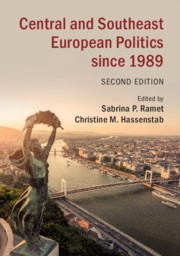Book contents
- Central and Southeast European Politics since 1989
- Central and Southeast European Politics since 1989
- Copyright page
- Dedication
- Contents
- Figures and Maps
- Tables
- Contributors
- Preface
- Glossary
- Guide to the Pronunciation of Central and Southeast European Words
- Additional material
- Part One Introduction
- Part Two Issues
- 3 Media, Journalism, and the Third Wave of Democratization in Former Communist Countries
- 4 Economic Reforms and the Burdens of Transition
- 5 The War of Yugoslav Succession
- Part Three Central Europe
- Part Four Yugoslav Successor States
- Part Five Southeastern Europe
- Part Six Present and Future Challenges
- Index
5 - The War of Yugoslav Succession
from Part Two - Issues
Published online by Cambridge University Press: 16 September 2019
- Central and Southeast European Politics since 1989
- Central and Southeast European Politics since 1989
- Copyright page
- Dedication
- Contents
- Figures and Maps
- Tables
- Contributors
- Preface
- Glossary
- Guide to the Pronunciation of Central and Southeast European Words
- Additional material
- Part One Introduction
- Part Two Issues
- 3 Media, Journalism, and the Third Wave of Democratization in Former Communist Countries
- 4 Economic Reforms and the Burdens of Transition
- 5 The War of Yugoslav Succession
- Part Three Central Europe
- Part Four Yugoslav Successor States
- Part Five Southeastern Europe
- Part Six Present and Future Challenges
- Index
Summary
The War of Yugoslav Succession (1991–1995) is Europe’s bloodiest war since World War Two. It represented the violent culmination of the political conflict within Yugoslavia of the late 1980s and early 1990s occasioned by the rise of nationalism, particularly within Yugoslavia’s Socialist Republic of Serbia; the weakening of the Yugoslav Communist regime; the seizure of power by Slobodan Miloševic in the Socialist Republic of Serbia in 1987; and his subsequent attempt to overturn the Yugoslav constitutional order. The “War of Yugoslav Succession” properly refers to the armed conflict of 1991–1995 in Croatia, Slovenia, and Bosnia-Herzegovina, involving all the Yugoslav republics except Macedonia. By far the bloodiest and most protracted phase of the conflict occurred in nationally heterogeneous Bosnia-Herzegovina in 1992–1995. Although the war was primarily fought between Yugoslav National Army and Serb forces on the one hand and Croatian and Bosnian forces on the other, a bitter conflict was also fought between Croat and Bosnian (predominantly Muslim) forces in Herzegovina and Central Bosnia in 1992–1994. The War of Yugoslav Succession is the most significant armed conflict to have taken place in Europe since 1945, one that influenced not only the entire course of regional politics and economic development, but also the relations of the major powers (the United States, Russia, and the states of the European Union); global perceptions of the meaning of national conflict, war crimes and genocide; and the evolution of international justice. It is a pivotal episode in the history of post-Cold War Central and Southeastern Europe. Of course, nowhere was its impact so great as it was upon the Yugoslav successor states themselves.
- Type
- Chapter
- Information
- Central and Southeast European Politics since 1989 , pp. 106 - 132Publisher: Cambridge University PressPrint publication year: 2019
- 2
- Cited by

